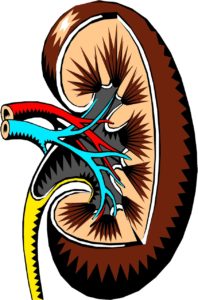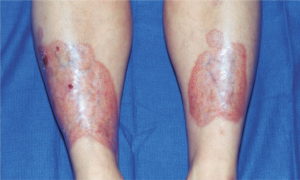Acute interstitial nephritis
Acute interstitial nephritis is characterized by interstitial inflammation and oedema. Left untreated this results in interstitial fibrosis.
A definitive diagnosis is established by renal biopsy, which usually shows interstial oedema with a heavy infiltrate of inflammatory cells and variable tubular necrosis, although eosinophiluria and gallium 67 scanning are also suggestive.
60-70% of cases of acute interstitial nephritis are induced by exposure to drugs. The mechanism is via a delayed T-cell hypersensitivity or cytotoxic T-cell reaction.
This is not typically dose-dependent. Multiple medications have been implicated, and the presentation and laboratory findings vary according to the class of drug involved.
Classic presenting features include fever, maculopapular rash and arthralgia. Mild eosinophilia is common, and eosinophiuria is pathognomonic.
Medicines causing acute interstitial nephritis
- Beta-lactam antibiotics (especially penicillin & methicillin)
- Cephalosporins
- Vancomycin
- Sulphonamides
- Rifampicin
- Quinolone
- NSAIDs
- Diuretics (thiazides, furosemide)
- Antivirals (acyclovir, foscarnet)
- Phenytoin
- Allopurinol
- Cyclosporin
- Omeprazole
Treatment
- Cessation of the causative offending agent.
- Corticosteroids (High-dose prednisolone) can have a beneficial effect it may accelerate recovery and prevent long-term renal damage, especially if initiated early.
- Dialysis may be required in severe cases.
In general, the prognosis of drug-induced acute interstitial nephritis is good, and partial or complete recovery of renal function is normally seen.
Chronic interstitial nephritis
Chronic interstitial nephritis (CIN) is a common description referring to a number of various nephropathies characterized by chronic inflammation that originates in the renal interstitium. It is associated with a progressive loss of glomerular filtration rate (GFR) over time and commonly also with tubular dysfunction.
Causes
Medications: Some medications, particularly certain antibiotics and nonsteroidal inflammatory drugs (NSAIDs) can be particularly toxic and damaging to the kidney. Persistent use of these drugs to treat other conditions can adversely affect the kidney and cause chronic inflammation, leading to chronic interstitial nephritis and chronic kidney disease.
Infections: Bacteria that invade and infect the kidney cause a type of infection known as pyelonephritis. Pyelonephritis that is not treated or treated improperly can result in chronic inflammation of the kidney interstitium.
Autoimmune conditions: Many inflammatory diseases that result in the body attacking itself can also affect the kidney and cause injury that results in interstitial nephritis. Conditions such as multiple sclerosis (MS) and lupus (SLE) are examples of such autoimmune diseases.
Treatment
Treatment includes identification and elimination of any exogenous agents (drugs, heavy metals), metabolic causes (hypercalcemia), or conditions (obstruction, infection) potentially causing the chronic interstitial lesion. Specific treatments may be required for a condition, such as corticosteroids for sarcoidosis. General measures include control of blood pressure. Most clinicians favor the use of angiotensin-converting enzyme (ACE) inhibitors or angiotensin receptor blockers (ARBs), which reduce glomerular and systemic pressures, decrease proteinuria, and increase renal blood flow.



